Challenges of Managing and Rewarding International Staff in MNCs Essay
VerifiedAdded on 2022/12/09
|6
|1252
|99
Essay
AI Summary
This essay critically evaluates the major challenges faced by multinational corporations (MNCs) in managing the performance of their international staff and rewarding them effectively. The paper delves into various factors impacting international employees' performance, including environmental factors, cultural adjustment, and technical knowledge. It discusses HRM practices, cross-cultural issues, and compensation management, highlighting challenges such as managing multicultural teams, the shortage of cross-cultural training, and family-related issues. Using the International Leadership and Management Development Programme (ILMDP) at Merlin as a case study, the essay analyzes the benefits and limitations of different HRM policies, such as leadership, retention, and staff training policies. It concludes by emphasizing the importance of developing comprehensive HRM policies, including polycentric, ethnocentric, and geocentric approaches, to minimize cultural differences and improve the management and rewarding of international employees. The essay references several academic sources to support its arguments and provides a comprehensive overview of the complexities of international HRM.
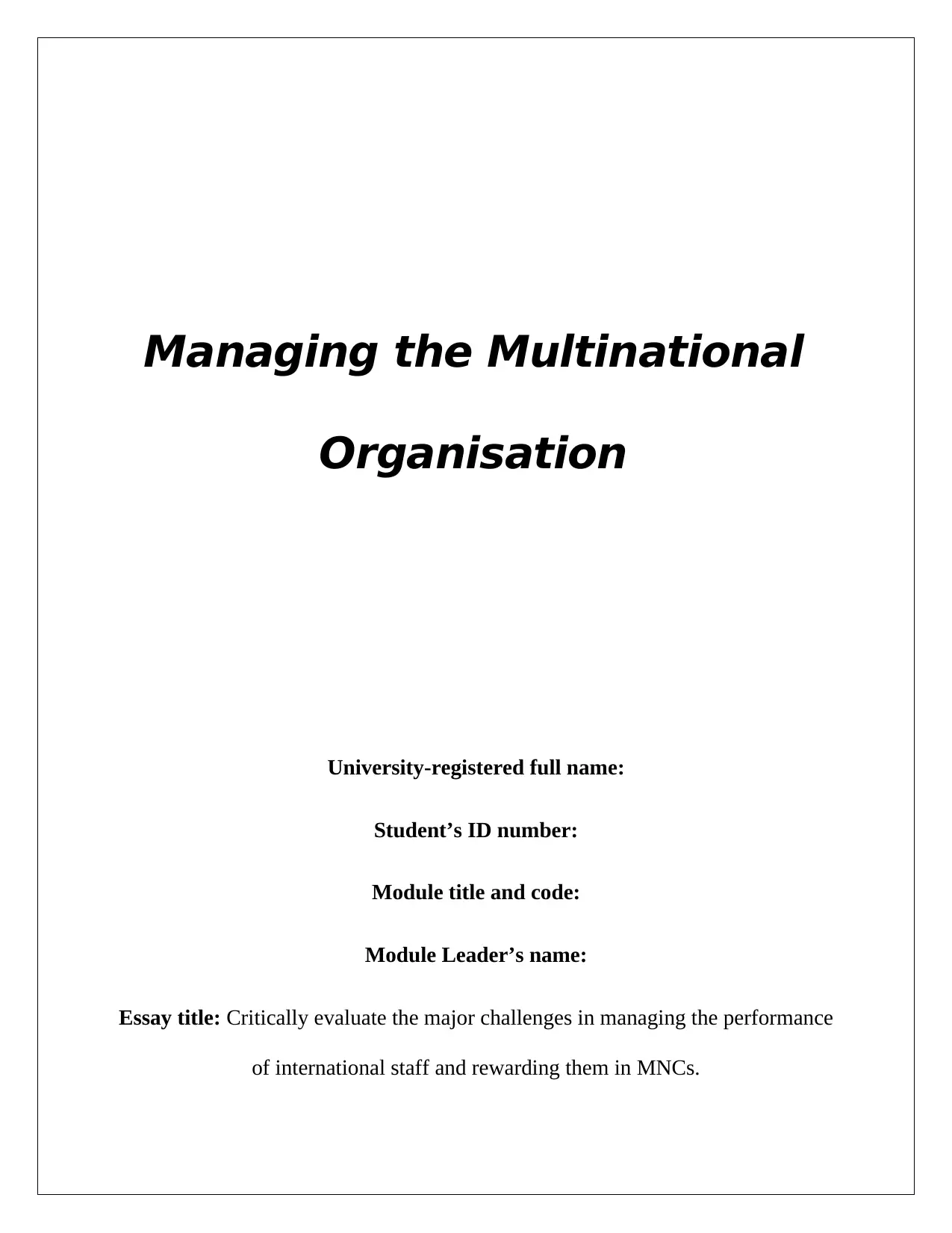
Managing the Multinational
Organisation
University-registered full name:
Student’s ID number:
Module title and code:
Module Leader’s name:
Essay title: Critically evaluate the major challenges in managing the performance
of international staff and rewarding them in MNCs.
Organisation
University-registered full name:
Student’s ID number:
Module title and code:
Module Leader’s name:
Essay title: Critically evaluate the major challenges in managing the performance
of international staff and rewarding them in MNCs.
Paraphrase This Document
Need a fresh take? Get an instant paraphrase of this document with our AI Paraphraser
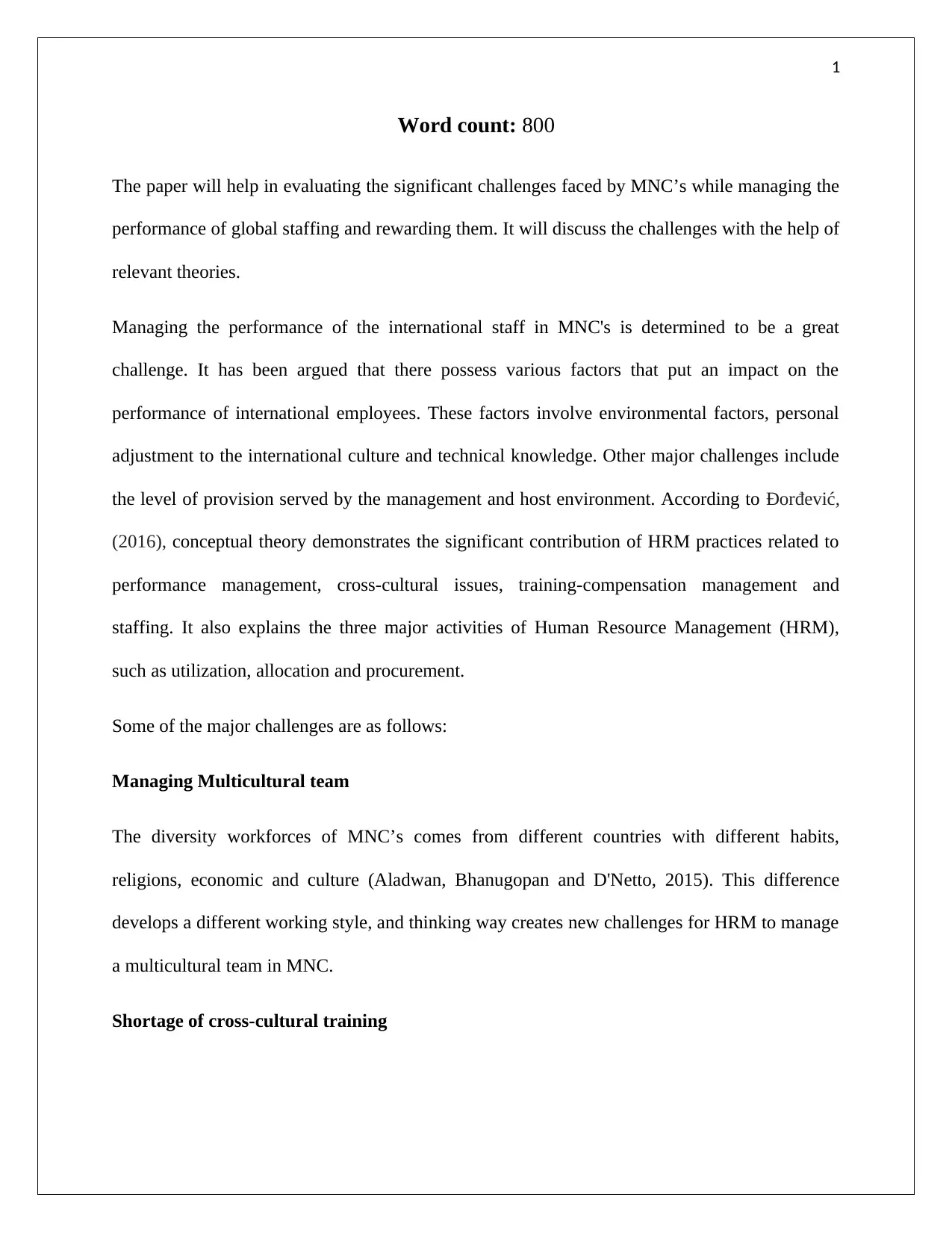
1
Word count: 800
The paper will help in evaluating the significant challenges faced by MNC’s while managing the
performance of global staffing and rewarding them. It will discuss the challenges with the help of
relevant theories.
Managing the performance of the international staff in MNC's is determined to be a great
challenge. It has been argued that there possess various factors that put an impact on the
performance of international employees. These factors involve environmental factors, personal
adjustment to the international culture and technical knowledge. Other major challenges include
the level of provision served by the management and host environment. According to Đorđević,
(2016), conceptual theory demonstrates the significant contribution of HRM practices related to
performance management, cross-cultural issues, training-compensation management and
staffing. It also explains the three major activities of Human Resource Management (HRM),
such as utilization, allocation and procurement.
Some of the major challenges are as follows:
Managing Multicultural team
The diversity workforces of MNC’s comes from different countries with different habits,
religions, economic and culture (Aladwan, Bhanugopan and D'Netto, 2015). This difference
develops a different working style, and thinking way creates new challenges for HRM to manage
a multicultural team in MNC.
Shortage of cross-cultural training
Word count: 800
The paper will help in evaluating the significant challenges faced by MNC’s while managing the
performance of global staffing and rewarding them. It will discuss the challenges with the help of
relevant theories.
Managing the performance of the international staff in MNC's is determined to be a great
challenge. It has been argued that there possess various factors that put an impact on the
performance of international employees. These factors involve environmental factors, personal
adjustment to the international culture and technical knowledge. Other major challenges include
the level of provision served by the management and host environment. According to Đorđević,
(2016), conceptual theory demonstrates the significant contribution of HRM practices related to
performance management, cross-cultural issues, training-compensation management and
staffing. It also explains the three major activities of Human Resource Management (HRM),
such as utilization, allocation and procurement.
Some of the major challenges are as follows:
Managing Multicultural team
The diversity workforces of MNC’s comes from different countries with different habits,
religions, economic and culture (Aladwan, Bhanugopan and D'Netto, 2015). This difference
develops a different working style, and thinking way creates new challenges for HRM to manage
a multicultural team in MNC.
Shortage of cross-cultural training
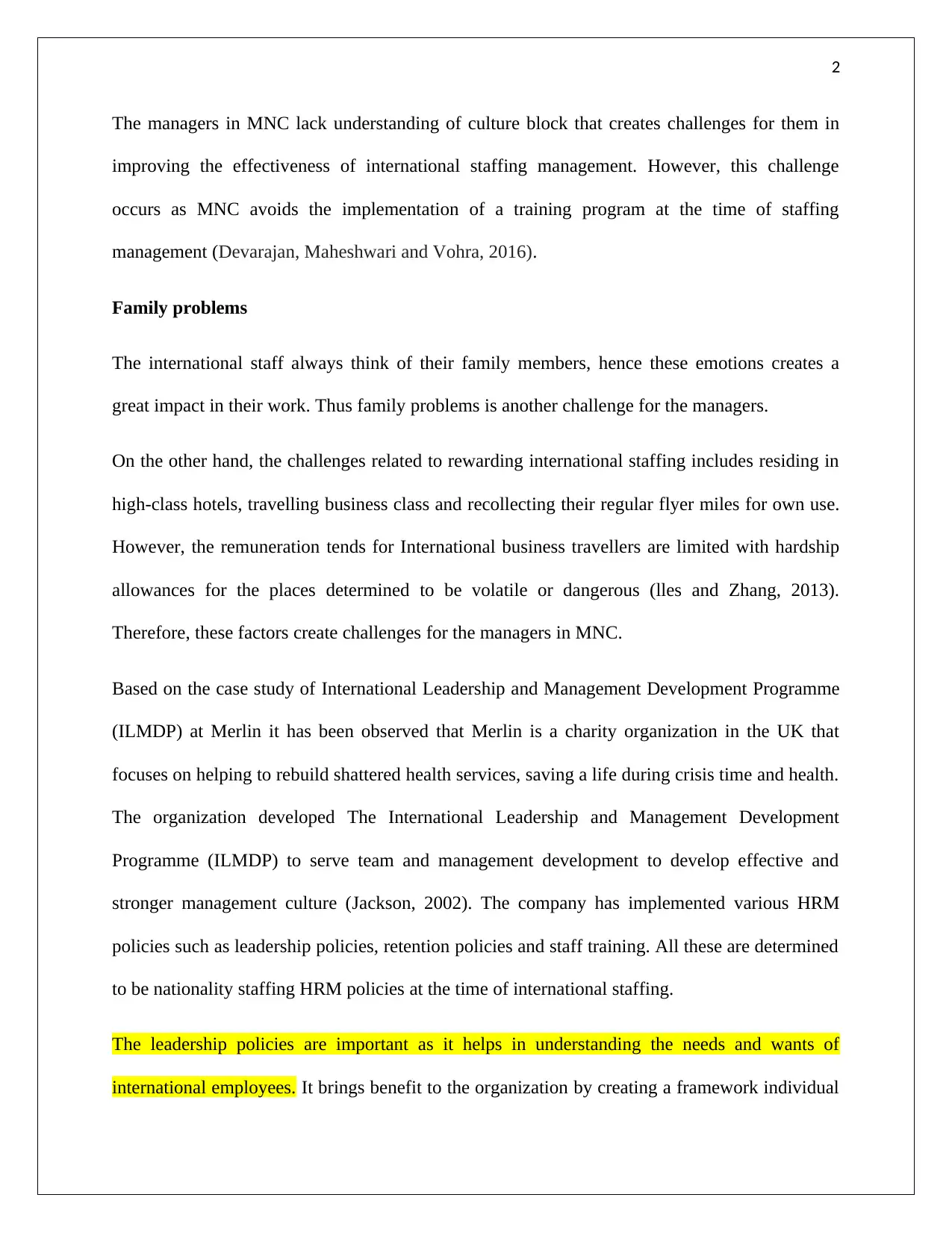
2
The managers in MNC lack understanding of culture block that creates challenges for them in
improving the effectiveness of international staffing management. However, this challenge
occurs as MNC avoids the implementation of a training program at the time of staffing
management (Devarajan, Maheshwari and Vohra, 2016).
Family problems
The international staff always think of their family members, hence these emotions creates a
great impact in their work. Thus family problems is another challenge for the managers.
On the other hand, the challenges related to rewarding international staffing includes residing in
high-class hotels, travelling business class and recollecting their regular flyer miles for own use.
However, the remuneration tends for International business travellers are limited with hardship
allowances for the places determined to be volatile or dangerous (lles and Zhang, 2013).
Therefore, these factors create challenges for the managers in MNC.
Based on the case study of International Leadership and Management Development Programme
(ILMDP) at Merlin it has been observed that Merlin is a charity organization in the UK that
focuses on helping to rebuild shattered health services, saving a life during crisis time and health.
The organization developed The International Leadership and Management Development
Programme (ILMDP) to serve team and management development to develop effective and
stronger management culture (Jackson, 2002). The company has implemented various HRM
policies such as leadership policies, retention policies and staff training. All these are determined
to be nationality staffing HRM policies at the time of international staffing.
The leadership policies are important as it helps in understanding the needs and wants of
international employees. It brings benefit to the organization by creating a framework individual
The managers in MNC lack understanding of culture block that creates challenges for them in
improving the effectiveness of international staffing management. However, this challenge
occurs as MNC avoids the implementation of a training program at the time of staffing
management (Devarajan, Maheshwari and Vohra, 2016).
Family problems
The international staff always think of their family members, hence these emotions creates a
great impact in their work. Thus family problems is another challenge for the managers.
On the other hand, the challenges related to rewarding international staffing includes residing in
high-class hotels, travelling business class and recollecting their regular flyer miles for own use.
However, the remuneration tends for International business travellers are limited with hardship
allowances for the places determined to be volatile or dangerous (lles and Zhang, 2013).
Therefore, these factors create challenges for the managers in MNC.
Based on the case study of International Leadership and Management Development Programme
(ILMDP) at Merlin it has been observed that Merlin is a charity organization in the UK that
focuses on helping to rebuild shattered health services, saving a life during crisis time and health.
The organization developed The International Leadership and Management Development
Programme (ILMDP) to serve team and management development to develop effective and
stronger management culture (Jackson, 2002). The company has implemented various HRM
policies such as leadership policies, retention policies and staff training. All these are determined
to be nationality staffing HRM policies at the time of international staffing.
The leadership policies are important as it helps in understanding the needs and wants of
international employees. It brings benefit to the organization by creating a framework individual
⊘ This is a preview!⊘
Do you want full access?
Subscribe today to unlock all pages.

Trusted by 1+ million students worldwide
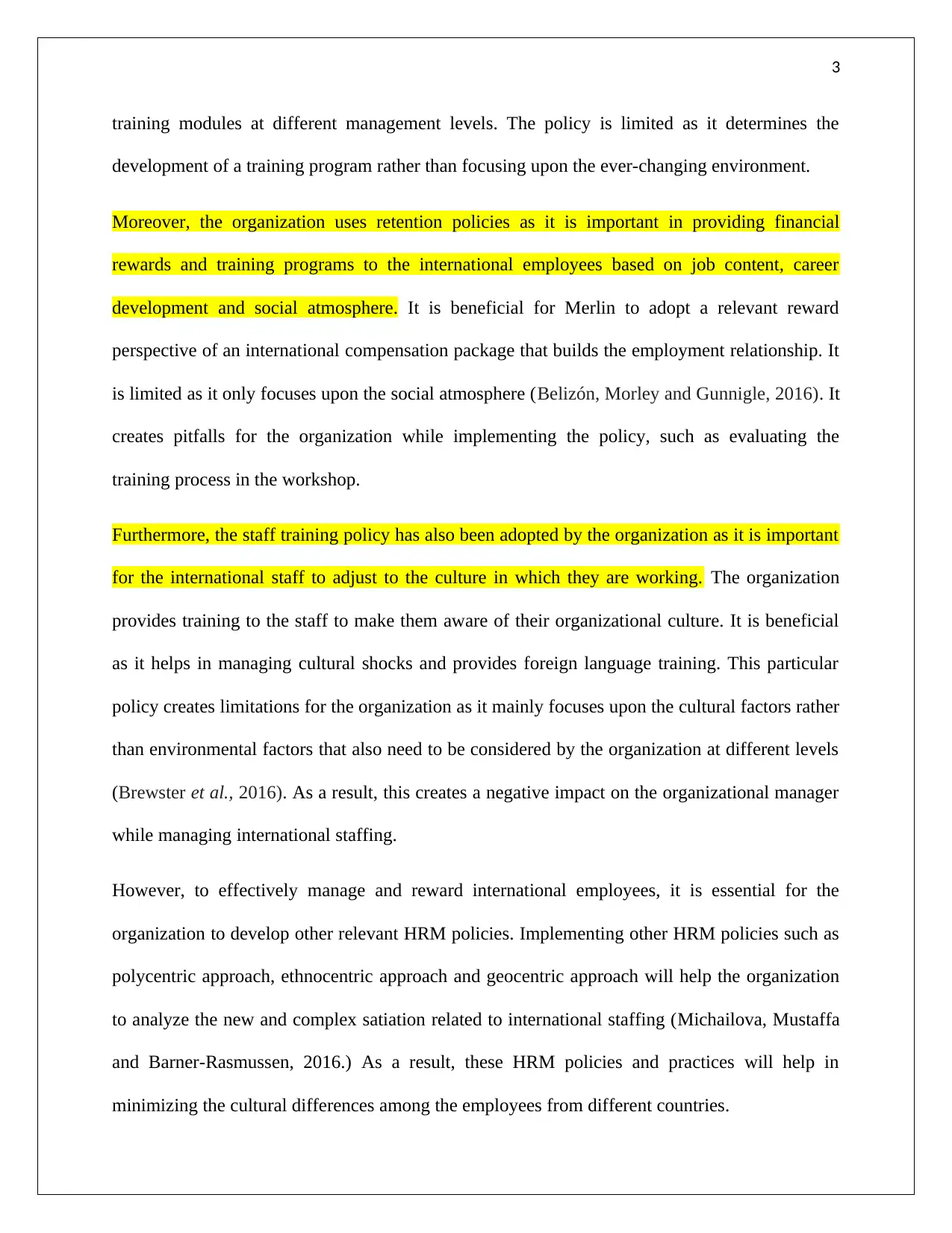
3
training modules at different management levels. The policy is limited as it determines the
development of a training program rather than focusing upon the ever-changing environment.
Moreover, the organization uses retention policies as it is important in providing financial
rewards and training programs to the international employees based on job content, career
development and social atmosphere. It is beneficial for Merlin to adopt a relevant reward
perspective of an international compensation package that builds the employment relationship. It
is limited as it only focuses upon the social atmosphere (Belizón, Morley and Gunnigle, 2016). It
creates pitfalls for the organization while implementing the policy, such as evaluating the
training process in the workshop.
Furthermore, the staff training policy has also been adopted by the organization as it is important
for the international staff to adjust to the culture in which they are working. The organization
provides training to the staff to make them aware of their organizational culture. It is beneficial
as it helps in managing cultural shocks and provides foreign language training. This particular
policy creates limitations for the organization as it mainly focuses upon the cultural factors rather
than environmental factors that also need to be considered by the organization at different levels
(Brewster et al., 2016). As a result, this creates a negative impact on the organizational manager
while managing international staffing.
However, to effectively manage and reward international employees, it is essential for the
organization to develop other relevant HRM policies. Implementing other HRM policies such as
polycentric approach, ethnocentric approach and geocentric approach will help the organization
to analyze the new and complex satiation related to international staffing (Michailova, Mustaffa
and Barner-Rasmussen, 2016.) As a result, these HRM policies and practices will help in
minimizing the cultural differences among the employees from different countries.
training modules at different management levels. The policy is limited as it determines the
development of a training program rather than focusing upon the ever-changing environment.
Moreover, the organization uses retention policies as it is important in providing financial
rewards and training programs to the international employees based on job content, career
development and social atmosphere. It is beneficial for Merlin to adopt a relevant reward
perspective of an international compensation package that builds the employment relationship. It
is limited as it only focuses upon the social atmosphere (Belizón, Morley and Gunnigle, 2016). It
creates pitfalls for the organization while implementing the policy, such as evaluating the
training process in the workshop.
Furthermore, the staff training policy has also been adopted by the organization as it is important
for the international staff to adjust to the culture in which they are working. The organization
provides training to the staff to make them aware of their organizational culture. It is beneficial
as it helps in managing cultural shocks and provides foreign language training. This particular
policy creates limitations for the organization as it mainly focuses upon the cultural factors rather
than environmental factors that also need to be considered by the organization at different levels
(Brewster et al., 2016). As a result, this creates a negative impact on the organizational manager
while managing international staffing.
However, to effectively manage and reward international employees, it is essential for the
organization to develop other relevant HRM policies. Implementing other HRM policies such as
polycentric approach, ethnocentric approach and geocentric approach will help the organization
to analyze the new and complex satiation related to international staffing (Michailova, Mustaffa
and Barner-Rasmussen, 2016.) As a result, these HRM policies and practices will help in
minimizing the cultural differences among the employees from different countries.
Paraphrase This Document
Need a fresh take? Get an instant paraphrase of this document with our AI Paraphraser
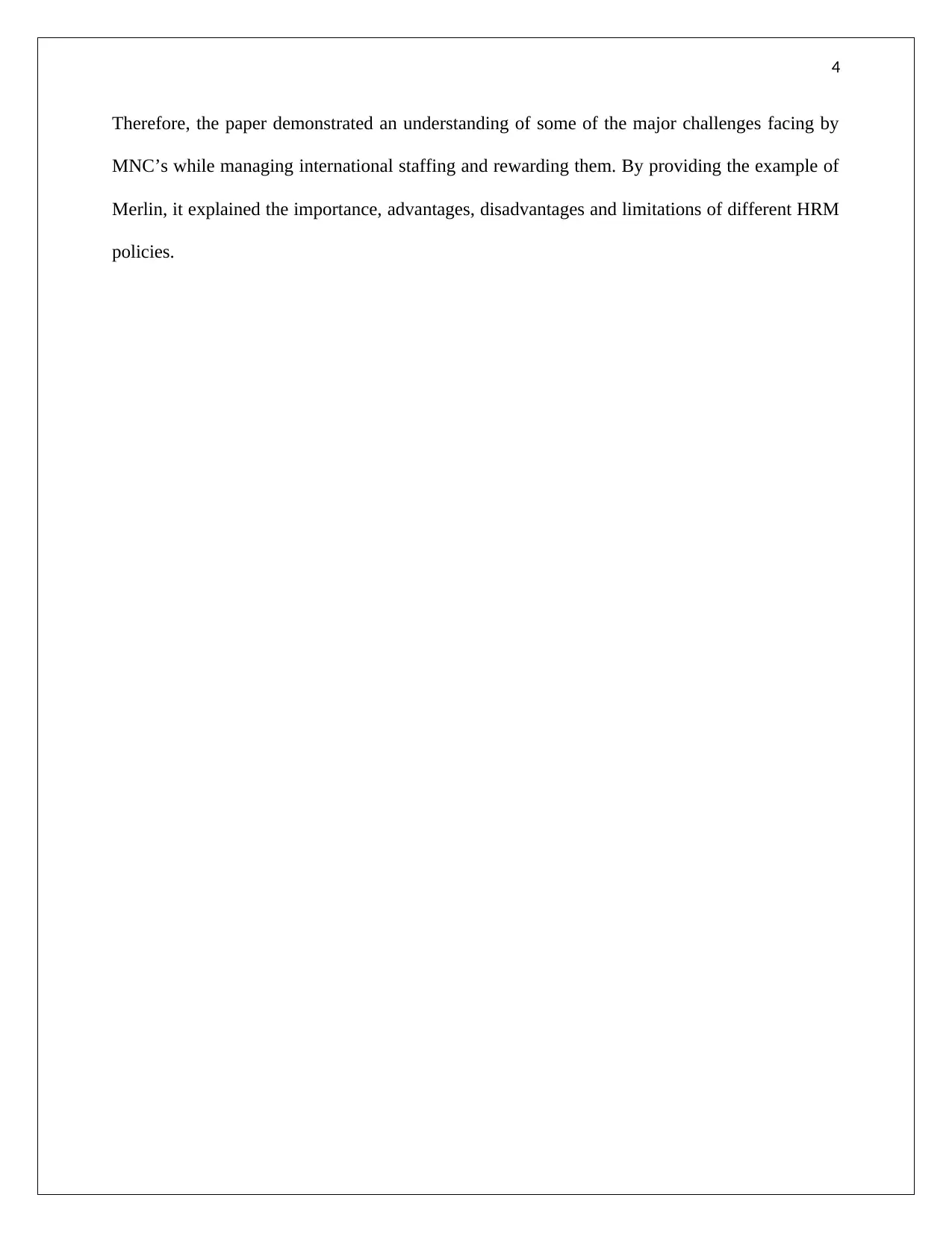
4
Therefore, the paper demonstrated an understanding of some of the major challenges facing by
MNC’s while managing international staffing and rewarding them. By providing the example of
Merlin, it explained the importance, advantages, disadvantages and limitations of different HRM
policies.
Therefore, the paper demonstrated an understanding of some of the major challenges facing by
MNC’s while managing international staffing and rewarding them. By providing the example of
Merlin, it explained the importance, advantages, disadvantages and limitations of different HRM
policies.
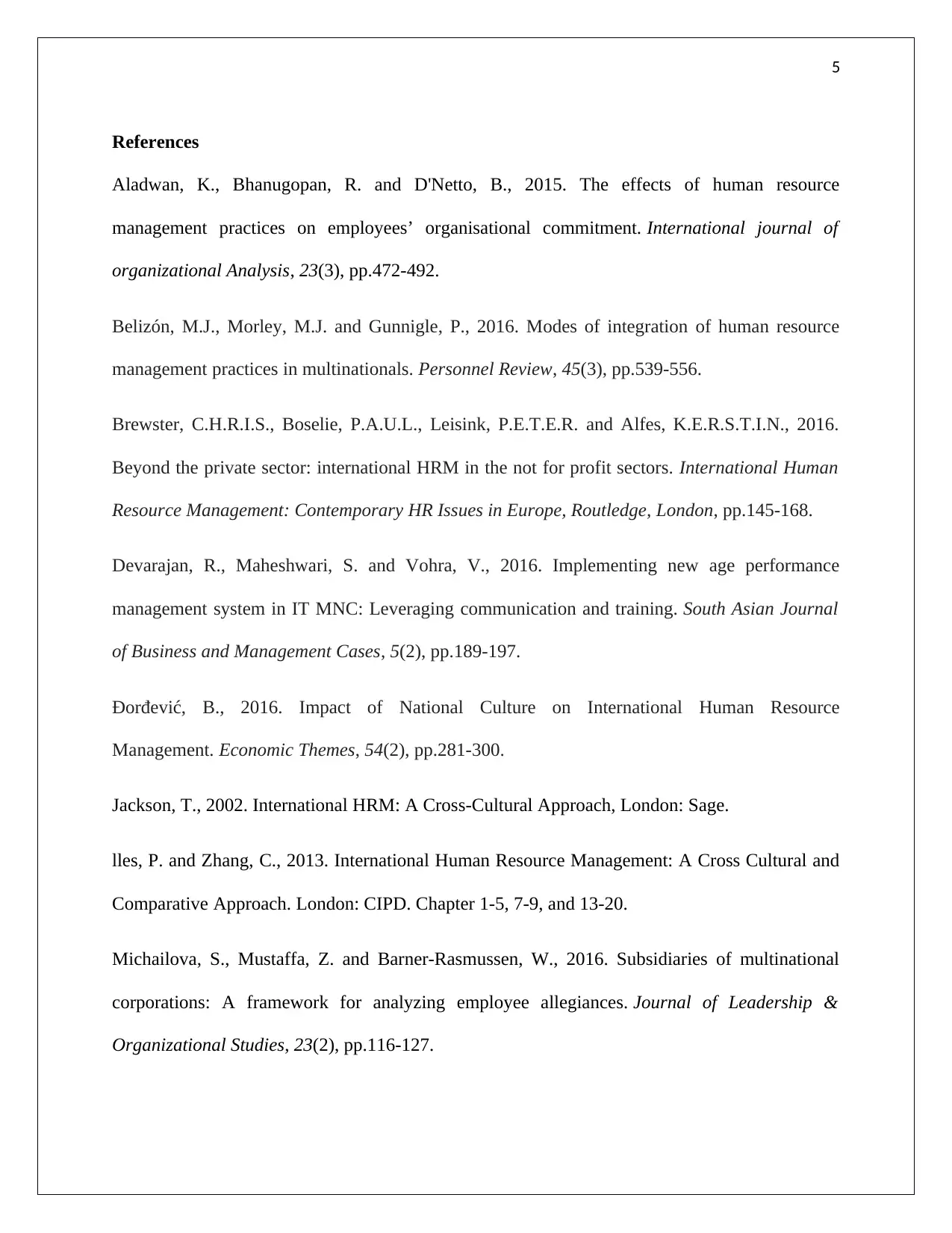
5
References
Aladwan, K., Bhanugopan, R. and D'Netto, B., 2015. The effects of human resource
management practices on employees’ organisational commitment. International journal of
organizational Analysis, 23(3), pp.472-492.
Belizón, M.J., Morley, M.J. and Gunnigle, P., 2016. Modes of integration of human resource
management practices in multinationals. Personnel Review, 45(3), pp.539-556.
Brewster, C.H.R.I.S., Boselie, P.A.U.L., Leisink, P.E.T.E.R. and Alfes, K.E.R.S.T.I.N., 2016.
Beyond the private sector: international HRM in the not for profit sectors. International Human
Resource Management: Contemporary HR Issues in Europe, Routledge, London, pp.145-168.
Devarajan, R., Maheshwari, S. and Vohra, V., 2016. Implementing new age performance
management system in IT MNC: Leveraging communication and training. South Asian Journal
of Business and Management Cases, 5(2), pp.189-197.
Đorđević, B., 2016. Impact of National Culture on International Human Resource
Management. Economic Themes, 54(2), pp.281-300.
Jackson, T., 2002. International HRM: A Cross-Cultural Approach, London: Sage.
lles, P. and Zhang, C., 2013. International Human Resource Management: A Cross Cultural and
Comparative Approach. London: CIPD. Chapter 1-5, 7-9, and 13-20.
Michailova, S., Mustaffa, Z. and Barner-Rasmussen, W., 2016. Subsidiaries of multinational
corporations: A framework for analyzing employee allegiances. Journal of Leadership &
Organizational Studies, 23(2), pp.116-127.
References
Aladwan, K., Bhanugopan, R. and D'Netto, B., 2015. The effects of human resource
management practices on employees’ organisational commitment. International journal of
organizational Analysis, 23(3), pp.472-492.
Belizón, M.J., Morley, M.J. and Gunnigle, P., 2016. Modes of integration of human resource
management practices in multinationals. Personnel Review, 45(3), pp.539-556.
Brewster, C.H.R.I.S., Boselie, P.A.U.L., Leisink, P.E.T.E.R. and Alfes, K.E.R.S.T.I.N., 2016.
Beyond the private sector: international HRM in the not for profit sectors. International Human
Resource Management: Contemporary HR Issues in Europe, Routledge, London, pp.145-168.
Devarajan, R., Maheshwari, S. and Vohra, V., 2016. Implementing new age performance
management system in IT MNC: Leveraging communication and training. South Asian Journal
of Business and Management Cases, 5(2), pp.189-197.
Đorđević, B., 2016. Impact of National Culture on International Human Resource
Management. Economic Themes, 54(2), pp.281-300.
Jackson, T., 2002. International HRM: A Cross-Cultural Approach, London: Sage.
lles, P. and Zhang, C., 2013. International Human Resource Management: A Cross Cultural and
Comparative Approach. London: CIPD. Chapter 1-5, 7-9, and 13-20.
Michailova, S., Mustaffa, Z. and Barner-Rasmussen, W., 2016. Subsidiaries of multinational
corporations: A framework for analyzing employee allegiances. Journal of Leadership &
Organizational Studies, 23(2), pp.116-127.
⊘ This is a preview!⊘
Do you want full access?
Subscribe today to unlock all pages.

Trusted by 1+ million students worldwide
1 out of 6
Related Documents
Your All-in-One AI-Powered Toolkit for Academic Success.
+13062052269
info@desklib.com
Available 24*7 on WhatsApp / Email
![[object Object]](/_next/static/media/star-bottom.7253800d.svg)
Unlock your academic potential
Copyright © 2020–2026 A2Z Services. All Rights Reserved. Developed and managed by ZUCOL.





